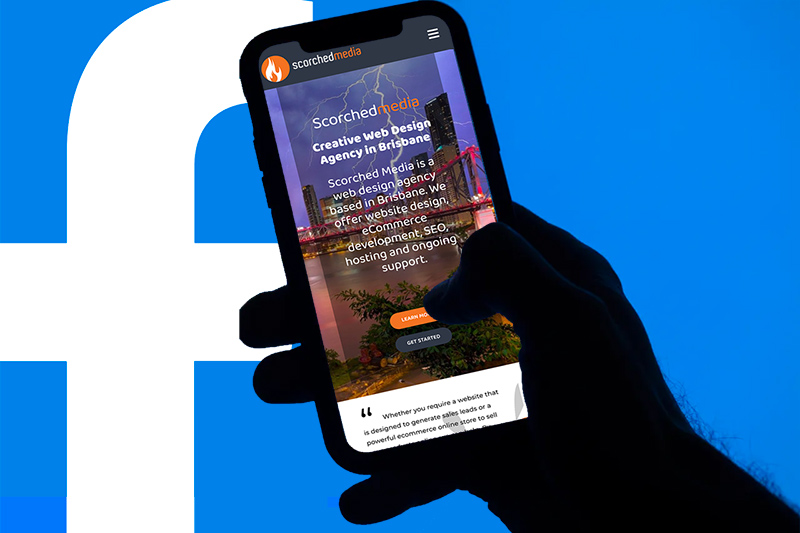Why You Need a Website Not Just Social Media

Social media platforms like Facebook, Instagram, and Linkedin are effective tools for reaching your audience and promoting your brand. However, relying solely on a website or social media can limit your potential. For a comprehensive online presence, you need both an engaging website and a strong social media strategy. Here’s why having a website or social media is crucial for your brand’s growth.
- Establishing Credibility and Professionalism
- Complete Ownership and Control
- Enhanced Branding and Customisation
- Greater Content Depth and Flexibility
- Search Engine Visibility and Organic Traffic
- Expanded Functionality and Integration
- Seamless Integration with Social Media
- Greater Lead Generation Potential
- Website Analytics for Deeper Insights
- Long-Term Stability and Growth
- Final Thoughts
- Frequently Asked Questions (FAQs)
Establishing Credibility and Professionalism
While a website or social media helps with visibility, a dedicated website adds an essential layer of credibility and professionalism. Your website acts as a digital storefront, showcasing your brand identity, products, services, and company information in an organised manner. It signals legitimacy, builds trust, and reassures potential customers that you’re serious about your business. Unlike social media, where design and layout are limited by platform guidelines, a website allows for customisation that reflects your brand’s ethos and professionalism.
Complete Ownership and Control
Whether you rely on a website or social media, social platforms are governed by external policies, algorithms, and ever-changing rules. This can affect how your content reaches your audience, limiting your control over user experience. A website, on the other hand, gives you complete ownership over your content, design, and interactions with visitors. You can tailor the user experience to your brand’s needs, ensuring consistency without being at the mercy of third-party changes. Unlike social media, where you “rent” your space, a website is like owning your property online.
Enhanced Branding and Customisation
A website or social media can support branding, but a website offers full customisation options, allowing you to create a distinct brand experience. From colour schemes and typography to layouts and graphics, you have the freedom to shape your digital presence to resonate with your audience. This flexibility helps maintain a consistent brand identity across all touchpoints, reinforcing recognition and trust. It’s also a chance to showcase your brand’s unique personality, values, and story, which can be harder to convey solely through social media posts.
Greater Content Depth and Flexibility
While a website or social media provides different levels of content engagement, websites excel at delivering in-depth information about your products, services, or expertise. A website enables you to dive deeper with blog posts, case studies, detailed service pages, and FAQs, offering comprehensive content that educates and engages your audience. This depth not only informs potential customers but also positions your brand as an authority in your industry. Additionally, longer content can improve your search rankings, driving more organic traffic to your site.
Search Engine Visibility and Organic Traffic
While a website or social media helps you reach followers, a website allows you to reach a broader audience through search engine optimisation (SEO). Websites are indexed by search engines like Google, enabling you to optimise for specific keywords, meta tags, and on-page elements. This boosts visibility for users searching for products or services related to your industry. The organic traffic generated by SEO is more likely to convert, as these users are actively seeking solutions you provide. In contrast, social media traffic is often more passive, driven by interest rather than intent.
Expanded Functionality and Integration
Websites offer opportunities for seamless integration with various tools and services that enhance user experience and streamline business operations. Whether you choose a website or social media, integration is key. You can incorporate features like e-commerce platforms, booking systems, customer service chatbots, or CRM tools directly into your website. This added functionality simplifies the user journey, making it easier for visitors to complete actions like purchases or bookings. By integrating third-party tools, your website becomes more than just a marketing platform—it becomes a hub for customer interaction and business growth.
Seamless Integration with Social Media
While a website or social media is essential, they don’t operate in isolation. They work best when integrated into a cohesive strategy. Linking your website to your social channels encourages visitors to engage across platforms, boosting overall brand interaction. You can embed social media feeds, add sharing buttons, or use call-to-actions that direct users to follow your profiles. This creates a feedback loop, where social media drives traffic to your site, and your site nurtures deeper engagement and conversions.
Greater Lead Generation Potential
Unlike social media, a website is designed specifically for lead generation. You can incorporate contact forms, email sign-ups, and downloadable resources to capture leads directly. This data can be used for targeted marketing campaigns, turning casual visitors into potential customers. Whether you’re using a website or social media, tools like Google Analytics can track user behaviour, refine your approach, and optimise for higher conversion rates.
Website Analytics for Deeper Insights
Websites provide detailed analytics that offer insights into visitor behaviour, conversion rates, and traffic sources. This data is invaluable for understanding what’s working and what needs improvement. Social media analytics, while useful, are often limited to engagement metrics like likes, shares, and comments. In contrast, website analytics reveal how long users stay on a page, where they drop off, and which pages convert best. This granular data helps you make informed decisions and refine your digital strategy.
Long-Term Stability and Growth
Social media trends and platforms change frequently, with some even losing popularity over time (e.g., MySpace or Google+). A website or social media can offer benefits, but a website provides a stable, long-term investment in your digital presence. It serves as the foundation of your online strategy, unaffected by changes in social media algorithms or platform-specific trends. By consistently updating and optimising your website, you ensure ongoing growth and adaptation to market changes.
Final Thoughts
While a website or social media plays a crucial role in your digital strategy, it shouldn’t be your sole asset. A dedicated website provides credibility, complete control, and the flexibility needed to create a comprehensive online presence. It allows for deeper engagement, lead generation, and a more robust digital strategy. By integrating both a website and social media into your marketing efforts, you maximise your reach, enhance customer relationships, and drive sustainable growth.
If you’re ready to build a website that complements your social media efforts and boosts your digital strategy, reach out to Scorched Media today. Let’s create a site that aligns with your brand, engages your audience, and drives results.
Frequently Asked Questions (FAQs)
Why is having a website important alongside social media?
A website provides credibility, control, and more depth than social media, allowing for better lead generation, SEO visibility, and a stronger brand presence.
Can a business succeed with just social media?
Social media helps with visibility, but relying solely on it can limit control and content depth. A website offers comprehensive engagement and growth opportunities.
How does a website enhance credibility compared to social media?
A website acts as a digital storefront, showcasing your brand in an organised, professional manner, which builds trust beyond what social media platforms can offer.
How does a website contribute to SEO?
Websites can be optimised for search engines, improving visibility and driving organic traffic from users actively seeking related products or services.
What’s the long-term benefit of a website versus social media?
Websites provide stability and growth unaffected by changing social media trends, making them a long-term investment in your digital strategy.




